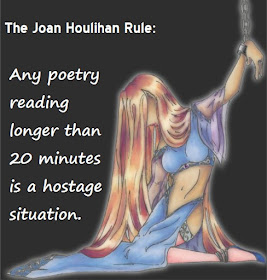 |
| Earl the Squirrel's Rule #51 |
Sounds like Washington!
It is time to stop the fight, as any compassionate referee would. Reality triumphed. It always does. Hey, what would you expect when one side enters the fray with only one weapon, unaware that it is a hara kiri knife?
"There is more poetry being written and published today than ever before."
Yes, we all understand that poetry is overproduced now more than ever. Why did no one stop to point out that, in quantifications, over-anything (e.g. overreach, overstock, overkill, etc.) is, by definition, a bad thing? What enterprise produces more of something in a tiny, flooded market? Wouldn't it make more sense to concentrate on the demand side?
It's time for everyone to hold hands and sing the opening stanza of Leonard Cohen's "Everybody Knows".
Everybody knows that the dice are loaded
Everybody rolls with their fingers crossed
Everybody knows that the war is over
Everybody knows the good guys lost
Everybody knows the fight was fixed
The poor stay poor, the rich get rich
That's how it goes
Everybody knows
We can now ask in the past tense: "Why has contemporary poetry failed?"
 |
| Earl the Squirrel's Rule #24 |
I would like to add another aspect, one that may be both cause and symptom: the lack of engagement, something so rare in poetry that I'll need to define it.
At their conventions most dentists enjoy the lectures and presentations. When they break for sustenance they talk about their families, practices, golf games, retirement plans and the prospects of the Dallas Cowboys--anything other than the seminar they just attended. Who but a complete nerd wants to talk shop over lunch?
 |
| Earl the Squirrel's Rule #28 |
Like dentistry, then, contemporary poetry creates a very low level of engagement. No "buzz", if you like. Attendees might be excited about the poet--I would give my right forepaw to see DPK!--but will usually not discuss the individual poems or lines they just heard and are already forgetting. How absorbing is a pursuit that people never discuss, even immediately after it is shared? Is an unexamined experience worth reliving?
 |
| How to play 5D on a Spade Jack lead? |
If people expressed 1% of the interest in poems--not poets, aesthetics or career opportunities, but poems--as bridgeplayers do in hands we wouldn't be having this conversation.
Footnotes:
¹ - In the first half of the 20th century almost everyone--poet or not--could recognize, if not recite, Robert Service's second most successful poem, "The Cremation of Sam McGee". Not counting occasional poems [that we are all trying to forget], can anyone cite a poem written in the last 50 years that even 5% of the world's 6,000,000 English language poets or 1% of the public can quote? Neither can I.
² - Compare that to Guest Poets who have to read a few of their own poems from a book.
No comments:
Post a Comment
Your comments and questions are welcome.